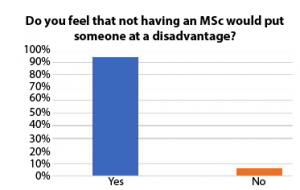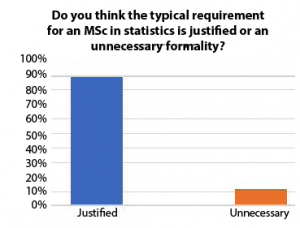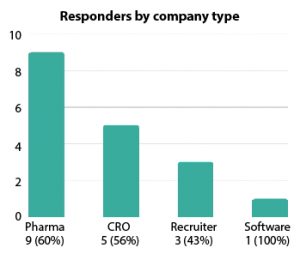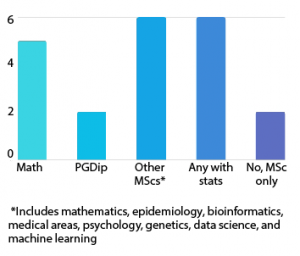 Sofia Baber has five years of experience working as a statistician in the pharmaceutical industry. She earned her BSc in mathematics with honors and MSc in statistics from Imperial College London before joining Quanticate in their UK head office. She worked there for a year before moving to Canada.
Sofia Baber has five years of experience working as a statistician in the pharmaceutical industry. She earned her BSc in mathematics with honors and MSc in statistics from Imperial College London before joining Quanticate in their UK head office. She worked there for a year before moving to Canada.
The vast majority of pharmaceutical companies and clinical research organizations (CROs) ask for a master’s degree (MSc) in statistics (or medical statistics) when hiring statisticians, claiming these degrees in particular provide adequate preparation and the necessary hands-on experience needed to work in the industry.
However, how strict is this rule across different companies, and should it be a requirement? Can similar qualifications, such as an MMath or PGDip (which can have a lot of crossover with traditional statistics MScs), be equivalent and provide the required statistical training for a successful career in industry? Or, can a BSc be sufficient?
I aimed to answer these questions by asking senior statistical leaders and recruiters the following four questions:
- Would you employ a graduate statistician without an MSc in statistics, but with an alternative master’s-level qualification?
- If yes, which alternative master’s-level qualifications would you consider?
- Do you feel that not having an MSc would put someone at a disadvantage?
- Do you think the typical requirement for an MSc in statistics is justified or an unnecessary formality?
Of the 34 people emailed, 18 (53 percent) responded. The percentages below are out of the total for that type of company.
Results
Would you employ a graduate statistician without an MSc in statistics, but with an alternative master’s-level qualification?
Some “yes” answers came with a condition—if it was an exceptional candidate, if they had right skills, if there was a good foundation in statistics, etc. The yes/no split was even between pharma companies and CROs.
Do you feel that not having an MSc would put someone at a disadvantage?
Almost everyone thought one would be at a disadvantage without any master’s degree, especially if starting out in their career. Six said a PhD is becoming a growing preference, with two of those saying not having a PhD would be a disadvantage, especially for American companies.

Do you think the typical requirement for an MSc in statistics is justified or an unnecessary formality?
The various reasons given were the following:
- Master’s degrees demonstrate hard work and knowledge
- CROs need to showcase their talent and an MSc does this
- The complexity and more practical components of an MSc
- Companies are pushing statisticians to be more technical, hence the high requirements
- MSc degrees provide better training and require more perseverance
One commented that BSc + Placement students could give MSc graduates a run for their money, and three said they would consider someone with a BSc if they fulfilled the requirements and had considerable relevant experience (10+ years) and depth of knowledge. Six said BSc + PhD would also be accepted.

There was confusion between different types of master’s degree. Respondents said the MSc requirement is justified but other master’s degrees are also fine. Clearly, the requirement is justified, but, in reality, not always necessary.
Final Word
From the results, we can conclude that some form of master’s degree is a definite requirement, and even a PhD is favorable. However, several of those surveyed said they know successful statisticians without a master’s degree.
Employers typically appear to be open to many types of master’s degrees. Some have not heard of more obscure ones such as MMath, but would happily accept it as a form of qualification if it demonstrates enough statistical content.
1. Find suitable contacts in pharmaceutical/biotech companies, CROs, universities, recruitment agencies, and others
2. Create draft“test” questions and send to small number of contacts, receive feedback to determine whether questions are clear and understood
3. Create final four questions and send to all contacts, collate results, conduct follow-up discussion
As one advances in their career and applies/progresses to more senior positions, the less relevant academic background is. Even graduates with an MSc and PhD can struggle to step on the career ladder, as companies are increasingly wanting industry experience.
Clearly, each company has their own policy. One general recommendation for the industry would be to promote this career choice in a wider variety of courses. Currently, the pharmaceutical industry gets no mention as a potential workplace in any traditional math courses.
Companies should also be more explicit about their entry requirements. Asking specifically for an MSc in statistics when they would be open to other qualifications eliminates many graduates who don’t apply because they are put off by the strict requirement and don’t realize they could be eligible. Also, companies should look into the course content, rather than just the name, to not miss out on quality candidates who may not match their ideal profile.
In short, while an MSc is not the be-all, end-all for a pharmaceutical statistician (though it helps), some sort of master’s in a quantitative discipline is recommended.






Leave a Reply